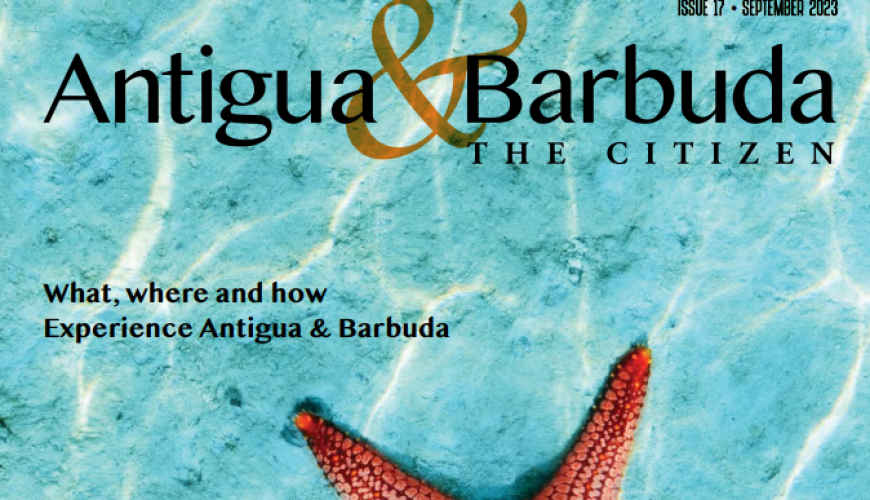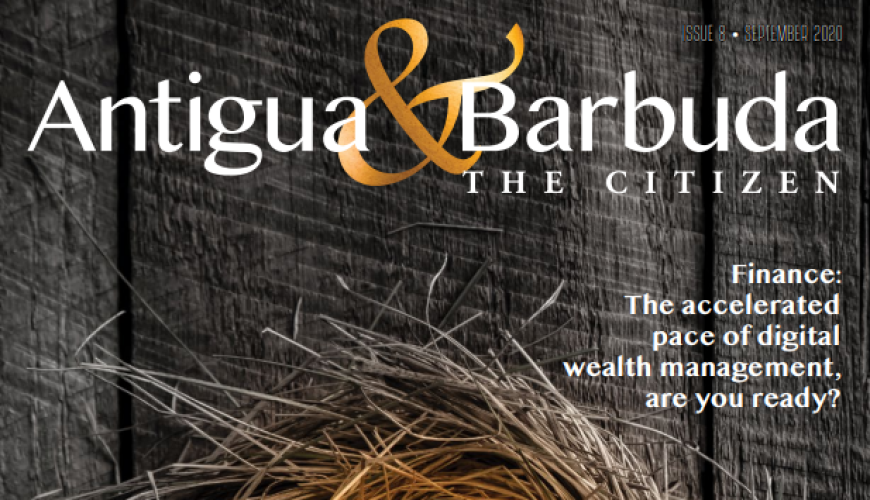Antigua Economic Growth: Driving Prosperity Through Innovation and Sustainability
This blog features Issue 17 of The Citizen from September 2023 which focuses on Antigua Economic Growth. The issue explores how these sectors have contributed to the nation’s development, including insights into the evolving CBI programs, investments in real estate and sustainable infrastructure, and the expansion of the financial services sector. How Antigua & Barbuda Can Stay Ahead in the New Age of Citizenship Citizenship by the investment industry was the product of a globalizing world. It all started in the 1980s when borders were beginning to blur. Capital and people were beginning to fly around the globe, and travel became more possible than ever. Business was truly multinational. ISLAND NATIONS: FLAUNT WHAT YOU’VE GOT What does a wise country with no significant population or natural resources do in a globalized world? The answer is simple: set up itself in the most appealing way possible to promote business. A passport was the key to what people wanted, three things in particular: privacy, visa-free travel, and freedom from excessive hassle. Out of these motivations, many programmes were born. Last of the independent Caribbean states to declare independence from Britain in 1983, St Kitts & Nevis hit the ground running and understood the assignment. It was the perfect moment to capitalize on one of the island economy’s most valuable assets: its citizenship and all the privileges that came with it. Antigua & Barbuda’s programme coupled well with the country’s leadership in the region for logistics, tourism, and transport, and a passport with some unique visa-free destinations such as South Africa. An industry was born. Clients were beginning to get what they wanted without the uncertainties of regular naturalization and the investments of time, money, and energy normally associated with it. Clients wanted to be part of the Commonwealth and go to the UK, and they got it. Clients wanted access to Europe; they got it. And money was pouring into economies that needed it. WHAT HAPPENED NEXT? Remember, new investor citizens didn’t just want to travel – they wanted the gatekeepers of desired institutions to perceive them in a completely different way. Opening a company as a Nigerian citizen? Banking as an Iraqi? Trading in and out of Iran? Easier said than done with certain identities. But the CBI could solve it all – almost. Obviously, nothing that simple ever lasts. CBI experienced its share of hits as time went on. Simplicity often gives way to complexity over time. And requirements only grew deeper as the digital information era began to take hold in the late 2000s. Admittedly, some of it was probably needed – the industry could not manage long-term growth unless it was managed properly. Antigua & Barbuda revamped its due diligence in the latter part of the last decade and joined in Caribbean-wide efforts to upgrade the product landscape. GOAL-POST ALWAYS MOVING, CARROT NEVER COMING? But now, the Tradewinds of Caribbean citizenship by investment programmes are changing. The introduction of US-led ‘6 Principles’ – backed by UK- and EU-based institutions – is changing the conversation towards one of an external locus of control, and I think it’s not for the best. Few would oppose proper due diligence protocols that protect a nation’s integrity and a programme’s reputation. But we all know that something has changed and that it goes far beyond these basic ideas. First, they came for Vanuatu, which many saw as an easy target or perhaps a harbinger of the EU’s rejection of island-based CBI. And now the inevitable has come: rumblings of complete EU visa-free suspension for Caribbean CBIs have changed the field. Anyone having any familiarity with the European Commission knows that this charade has long ceased to have anything to do with due diligence. The EU’s hypocrisy for complaining about well-vetted, wealthy immigrants coming through the ‘backdoor’ means nothing with even the most cursory look at their ignorance of migration crises and illegal immigration, which remain barely addressed. Retaining the core value proposition of CBI itself is existential to the survival of this entire multi-billion-dollar industry. So how can Antigua & Barbuda stay competitive as a citizenship programme? Value client privacy and efficiency One of the foundational value propositions of citizenship by investment is privacy. In a world where everything is trackable and traceable, many people turn to our programmes to get better control of their identity. Privacy does not mean fraud. Privacy does not mean illegality. Privacy does not mean ‘secrecy’. Privacy includes many things – including the right to change or choose your nationality, conceal personal information from prying eyes, and much more. Once you begin to factor in the weight of all the onerous and lengthy requirements for due diligence, the ‘checkbox checked’ personal interviews of questionable utility and several other constantly-evolving definitions of ‘genuine links’ or ‘proper vetting’, the whole notion of privacy begins to degrade, and clients don’t like that. Stop obsessing over Schengen access I’ve written before about this topic and have developed a small bit of niche notoriety with it. But the point here is not whether you or I personally like traveling to Europe. It’s about whether this feature is the most important (or, for some people, the only) reason to market or buy citizenship by investment. True ‘visa-free’ Schengen access itself is, in any case, about to sunset with the introduction of ETIAS, a sort of electronic pre-authorisation not unlike that of Australia’s ETA or America’s ESTA. Remember: true visa-free travel died after COVID-19. If you need to present a pre-authorisation or paperwork at the border, that’s a visa. Regardless, shouldn’t anyone with US$150,000+ to their name who passes extensive due diligence be more than able to obtain a Schengen visa or any visa they want? I have heard many with far less get far further than that. Visa-free Schengen in 2023 isn’t make-or-break for anything – or at least it shouldn’t be. It is not the only reason to get Antiguan citizenship. Do not fall for excessive hassle in KYC policy I think
-
 BY Book Antigua Agent
BY Book Antigua Agent
- September 22, 2024 9:52 pm
- no comment
Antigua Digital Wealth: Using Technology to Do Good!
This blog features Issue 8 of The Citizen from September 2020 which is about Antigua digital wealth & how the Caribbean nation is evolving technology. This issue highlights how digital tools are transforming wealth management in Antigua, the importance of protecting the region’s biodiversity, and how modern innovations are reshaping historical preservation and philanthropic efforts. The Accelerated Pace of Digital Wealth Management: Are You Ready? The landscape of wealth management is rapidly evolving with the advent of digital technologies. This blog post explores the accelerated pace of digital wealth management and how individuals and businesses can prepare for this shift. Digital Transformation in Wealth Management Digital wealth management leverages technology to enhance financial services, offering more personalized and efficient solutions. From robo-advisors to blockchain, these advancements are reshaping how wealth is managed and invested. Benefits of Digital Wealth Management Preparing for the Digital Shift To stay ahead in the rapidly changing landscape of wealth management, individuals and businesses should embrace digital tools and platforms. Continuous learning and adaptation are key to leveraging the full potential of these technologies. The accelerated pace of digital wealth management presents both challenges and opportunities. By embracing digital transformation, individuals and businesses can optimize their financial strategies and achieve greater financial success. West Indian Whistling-Duck: One of the Islands’ Rarest Inhabitants The West Indian Whistling-Duck is one of the rarest and most fascinating inhabitants of Antigua & Barbuda. This blog post delves into the characteristics, habitat, and conservation efforts surrounding this unique species. Characteristics of the West Indian Whistling-Duck The West Indian Whistling-Duck is known for its distinctive whistling call, which sets it apart from other duck species. These birds are primarily nocturnal and are often found in wetlands, mangroves, and ponds. Habitat and Behavior These ducks are native to the Caribbean and prefer habitats with abundant water sources. They are highly adaptable but face threats from habitat destruction and hunting. Conservation efforts are crucial to ensure their survival. Conservation Efforts Local and international conservation groups are working to protect the West Indian Whistling-Duck through habitat preservation and public education. These efforts aim to raise awareness about the importance of conserving this rare species. The West Indian Whistling-Duck is a vital part of Antigua & Barbuda’s natural heritage. Continued conservation efforts are essential to protect this unique species and maintain the biodiversity of the islands. Unearthing Antigua’s History Antigua & Barbuda have a rich and diverse history waiting to be unearthed. This blog post explores the archaeological efforts and historical discoveries that shed light on the islands’ past. Archaeological Discoveries Recent archaeological excavations have uncovered artifacts and structures that provide insight into the early inhabitants of Antigua & Barbuda. These discoveries include ancient pottery, tools, and remnants of early settlements. Historical Significance The findings highlight the islands’ historical significance as a hub of cultural and economic activity in the Caribbean. They reveal the sophisticated society that once thrived here and their interactions with neighboring islands and cultures. Preserving History Efforts to preserve and study these archaeological sites are crucial for understanding the islands’ heritage. Museums and educational programs play a vital role in sharing this knowledge with the public and preserving it for future generations. Unearthing Antigua & Barbuda’s history through archaeological research provides valuable insights into the islands’ past. These discoveries enrich our understanding of the region’s cultural heritage and underscore the importance of preserving these historical treasures. Philanthropy: Using Technology to Do Good Technology is revolutionizing the way philanthropy is conducted, making it more efficient and impactful. This blog post explores how technology is being used to enhance philanthropic efforts and drive social change. Tech-Driven Philanthropy Digital platforms and tools are enabling more effective fundraising, data analysis, and resource allocation. From crowdfunding websites to mobile donation apps, technology is expanding the reach and efficiency of philanthropic initiatives. Benefits of Tech-Driven Philanthropy Innovative Examples Several innovative tech-driven philanthropic initiatives are making a significant impact. These include platforms that facilitate direct donations to individuals in need, blockchain-based systems for tracking donations, and AI-powered tools for identifying the most effective interventions. Technology is transforming philanthropy, making it more efficient, transparent, and impactful. By leveraging these tools, philanthropic organizations can enhance their efforts to address social challenges and drive meaningful change. Continue reading Issue 9 to explore how technology, conservation, and history shape Antigua & Barbuda’s future. Read about digital wealth management, rare wildlife, and more in Issue 8 of The Citizen!
-
 BY Book Antigua Agent
BY Book Antigua Agent
- September 21, 2024 9:18 pm
- no comment


